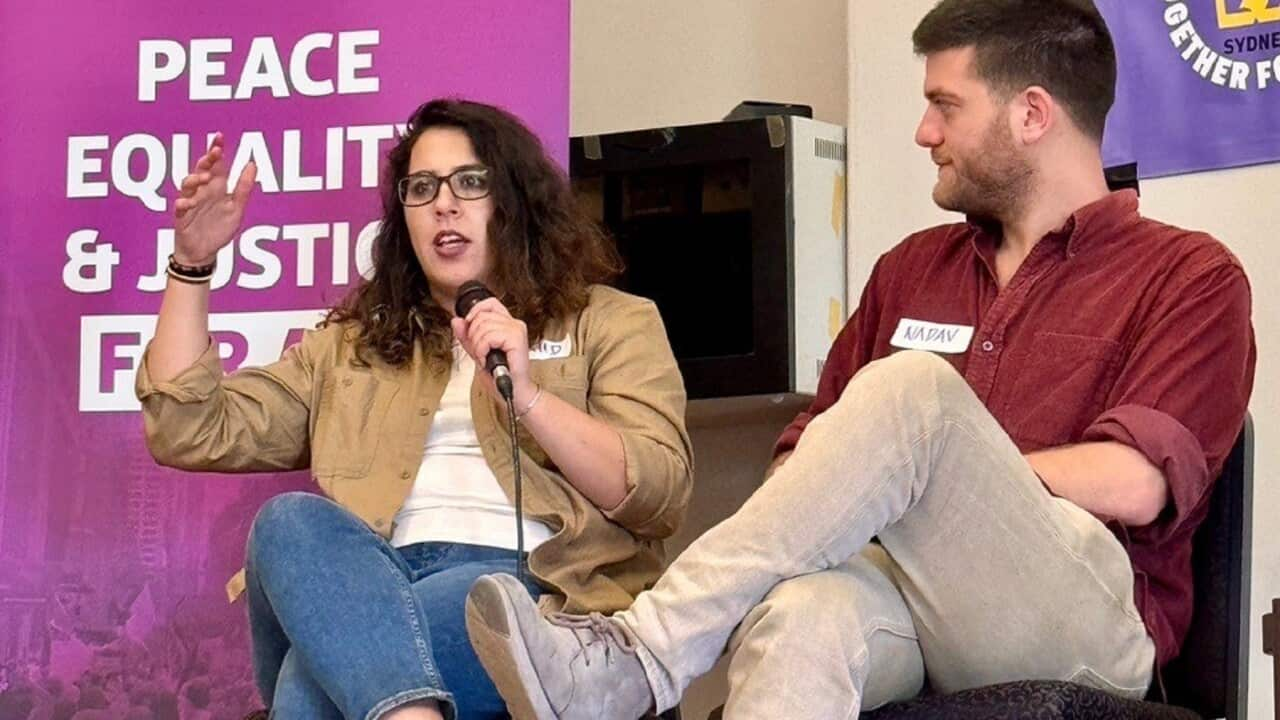TRANSCRIPT:
In Tel Aviv, thousands of people have taken to the streets, calling for a ceasefire in Gaza, and the release of Israeli hostages still held by Hamas.
Relatives of those taken, and others, blame Israeli Prime Minister Benjamin Netanyahu’s government for not doing enough to reach a deal to bring their loved ones home, 13 months after the attack by Hamas militants which killed 1,200 people, triggered the war and saw 250 people taken to Gaza.
Zahiro Shahar-Mor is a relative of one of the hostages.
"They are still there because of Benjamin Netanyahu. After 400 days, it is time to clearly state on every stage and every media outlet. The war in Gaza must end and all our hostages must be brought home."
It's not just these protesters calling for a deal.
An Israeli group called Standing Together - made up of Palestinian and Jewish citizens of Israel - also wants to see action.
Nadav Shofet is one of the group's leaders.
He says they want to see a permanent end to the war - but argues it has become harder to achieve this aim as the country moves further to the right.
"Our government is deteriorating into fascism, and the police has been taken over by the far right and therefore are putting, restrictions on our activity. But we also see that more and more people are understanding that this war is not benefiting absolutely anyone in the region. And that means Palestinians, but also Jewish Israelis. And therefore we see a larger and larger outpour of protests against the government for a hostage release deal, for a ceasefire agreement for the end of the war. And we are seeing our support and our numbers grow as well."
Another of the groups' leaders, Dr Shahd Bishara, is an Arab Palestinian citizen of Israel.
She says it's hoped their group can step into at least some of that political vacuum.
"Standing Together is the biggest and largest, grassroots movement that mobilises Palestinian Arabs and Israeli Jewish citizens of Israel, toward, equality, social justice and peace. This is what we are doing. We are mobilising people, doing activities, rallies, and so on in order to achieve these things."
Both Qatar and the US have been acting as mediators in the effort to bring about a ceasefire.
Qatar has just announced it is suspending mediation efforts, citing growing frustration with the lack of progress.
It's unclear what impact the election of Donald Trump in the US might have on negotiations in the future, but Mr Shofet says he's sceptical that the president-elect will help achieve peace.
"The election of Donald Trump is indeed gives us a lot of fear for the region, but we do not again, put our trust in these leaders from from other countries. We know that the change will have to come when we fight and we fight for the soul of our society, for the people in our land for the future that we want to see for ourselves."
The two activists are currently in Australia, where they hope to garner support for their cause.
They're booked to speak at a number of public events and private briefings in Sydney, Melbourne and Canberra, where the group's leadership will outline their work in building a Jewish-Arab grassroots movement.
Dr Bishara says they are hopeful of building the political strength required to achieve their goal.
''We definitely do have hope because we are working together, we are doing and amplifying our, our voices, and we see the recruitment of more and more public coming and joining us. Our government is doing anything to keep the status quo, to keep the war, just so they can stay in power. We are doing everything to stop them or to try to pressure them in order to finish this horrific war.'
But Standing Together is facing opposition from both the left and the right of the political spectrum.
The Boycott, Divestment and Sanctions Movement - or BDS - which promotes the boycott of Israel, and Israeli companies and investments, says Standing Together supports the status quo.
Nasser Mashni is the son of a Palestinian refugee, the president of the Australia Palestine Advocacy Network, and the local representative of BDS.
"We don't think they are going about it the right way. In fact, the Australia Palestine Advocacy Network has chosen not to engage with Standing Together and other groups like Standing Together. We have an opposition to normalisation and an opposition to groups that won't adhere to what are the Palestinian fundamental rights, which are not negotiable in our work. And they include the right of each Palestinian refugee to return, a complete end to apartheid, the acknowledgement that the Nakba in 1948 is foundational. Standing Together and other organisations like Standing Together do their work based around a rhetoric that Israel can be better or kinder."
Shahd Bishara and Nadav Shofet disagree.
They say it's possible to create an alternative to the existing reality.
And they say they are concerned the war in Gaza is fuelling antisemitism and Islamophobia globally.
"The public discourse in Israel but also abroad is creating this polarisation between Jews and Palestinians. And then we see very disturbing amounts of antisemitism and of Islamophobia on the rise. But we know - and this is how we operate inside of Israel - that the vast majority of both Jews and Palestinians has an interest, has a self-interest in these things that we are talking about: peace, equality, and social justice."













